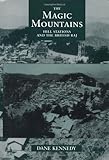The magic mountains : hill stations and the British raj / Dane Kennedy.
Material type: TextPublication details: Berkeley : University of California Press, c1996.Description: xiii, 264 p. : ill., maps ; 24 cmISBN:
TextPublication details: Berkeley : University of California Press, c1996.Description: xiii, 264 p. : ill., maps ; 24 cmISBN: - 0520201884 (hbk.)
- 9780520201880 (hbk.)
- 954.00943 KEN 23 004283
| Item type | Current library | Call number | Status | Date due | Barcode |
|---|---|---|---|---|---|
 Book
Book
|
Indian Institute for Human Settlements, Bangalore | 954.00943 KEN 004283 (Browse shelf(Opens below)) | Available | 004283 |
Browsing Indian Institute for Human Settlements, Bangalore shelves Close shelf browser (Hides shelf browser)

|

|

|

|

|

|

|
||
| 954.0072 RES 002793 The resources of history : | 954.00882971 VAR 000130 Ethnic conflict and civic life : | 954.00882971 NAQ 012600 Being the other : | 954.00943 KEN 004283 The magic mountains : | 954.0099 MUK 010959 Heroines : | 954.0099 MUK 018362 The RSS : icons of the Indian right / | 954.02 EVO 008387 The evolution of a nation pre-colonial to post-colonial : |
Includes bibliographical references (p. 231-253) and index.
Kennedy charts the symbolic and sociopolitical functions of the hill stations during the nineteenth and early twentieth centuries, arguing that to the British in India these communities were much more than mere pleasure spots. Particularly after the revolt of 1857, they became political and military headquarters and cantonments for colonial troops. In addition, they were centers of local and regional development that provided employment for countless Indians, who often traveled great distances to work in the hill stations as servants, merchants, and clerks. These citadels also served year-round as places for British women to bear and raise children, promoting the biological and cultural reproduction of the colonial elite.
Kennedy argues that the isolation of British authorities at the hill stations reflected the paradoxical character of the British raj, attempting to control its subjects while remaining separate and aloof from Indian society. Ironically, as more Indians were drawn to these mountain areas, first for work and later for pleasure, the carefully maintained boundaries between the British and their subjects eroded. Kennedy shows that the hill stations were increasingly incorporated within the landscape of Indian social and cultural life, especially after the turn of the century.


There are no comments on this title.